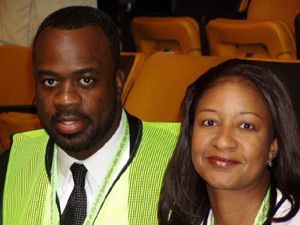Photos
More from MPR
Your Voice
| ||||||||||||||||||||||||||||||||||||||
Delegates from elsewhere have advice for Minnesota Democrats
July 27, 2004
In 2000, the Minnesota delegation was seated in the risers as Democrats nominated Vice President Al Gore for the presidency in Los Angeles' Staples Center. This year, Minnesota Democrats have a front-row seat at Boston's Fleet Center. Many factors affect a delegation's seating, but one of them is likely the state's status as a newly-minted battleground state.
Boston, Ma. — First, a few facts dear to the heart of any DFLer: Minnesota hasn't voted for a Republican presidential candidate in more than 30 years. It's the homestate of Democratic heavyweights Hubert Humphrey, Walter Mondale, and Paul Wellstone. That's the reputation recited by former Boston City Council President Lawrence DiCara during welcoming remarks to the Minnesota delegates at a morning breakfast.
"So much of the intellectual energy and so much of the integrity of this nation and of the Democratic Party has come from Minnesota and Massachusetts over the past 50 or 60 years. If you think of all the heroes that we have , so many of them are from our two states," he said.
But in 2004, the old script seems outdated. Four years ago, President George W. Bush lost the state by fewer than three percentage points. This year, polls show the race is even tighter. Bill Knapp is a senior advisor to the campaign of Senators John Kerry and John Edwards.
"I remember in 2000 with Gore, we had to work hard to carry that state. So, look, it's a state that's always received a fair amount of attention. I think it's a bit of a stereotype to say that it's traditionally Democratic. And actually, it's become more of a swing state. The suburbs have grown," according to Knapp.
Knapp says the voters are so polarized now, that he doesn't expect Kerry to get any "bounce" in the polls because of this week's convention. And he doesn't expect George Bush to get one next month at the Republican convention in New York either.
Knapp says he's nevertheless confident that Kerry will carry the state in November. A quick survey on the convention floor found similar expectations -- but with a twinge of regret. Mark Feinroth, a delegate from Olney, Maryland, doesn't find it terribly surprising.
"But I'm sad about it that the land of Hubert Humphrey and Walter Mondale and Paul Wellstone has such a large group of Republican elected officials today. But I don't think there's any reason to regard it as a permanent shift. I think it's more an aberration," Feinroth said.
Polls show Maryland is firmly in the Kerry column. Alabama is a different story. Once a solid Democratic state, Alabama has been fertile ground for Republicans in recent decades. The transformation was different -- different times, different issues -- but Birmingham delegate Sheila Smoot says Minnesotans can learn something from the past.
"What I think they need to do is to go back and start from Square One. What does the Democratic Party mean to the folks in Minnesota? We need to go back and regroup in Alabama. What does the Democratic Party really mean to Alabamians? What is it going to do -- as they say, 'What has it done for me lately?' They need to figure that out," she said.
Rick Stafford is Democratic National Committee member from Minnesota. He says the state party has worked diligenty to be relevant to wide range of voters -- something he says Republicans haven't done. He says that will make the difference.
"There's enough of a Minnesota tradition that they don't want... we're discrimintating people or we're using wedge issues like that to divide us to get people elected," Stafford said.
Stafford says Minnesota Democrats haven't conceded anything. Based on polls, neither have the Republicans.
|
News Headlines
|
Related Subjects
|


